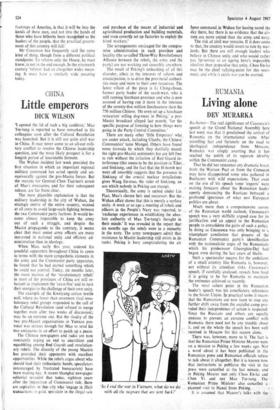Little emperors
CHINA DICK WILSON
'I opened the lid of such a big cauldron,' Mao Tse-tung is reported to have remarked to his colleagues soon after the Cultural Revolution was launched. But it is still not quite civil war in China. It may never come to an all-out mili- tary conflict to resolve the Chinese leadership question, and the more likely prospect is for a longish period of inscrutable ferment.
The Wuhan incident last week provided the first situation in which an important regional military command has acted openly and un- equivocally against the pro-Maoist forces. But the reasons for General Chen Tsai-tao's arrest of Mao's emissaries, and for their subsequent release, are far from clear.
The most plausible explanation is that the military leadership in the city of Wuhan, the strategic centre of the entire country, wanted at all costs to avoid large-scale fighting between the two Communist party factions. It would be- come almost impossible to keep the army out of such a struggle, and despite the Maoist propaganda to the contrary, it seems clear that most senior army officers are more interested in national unity and efficient ad- ministration than in ideology.
When Mao, early this year, ordered his youthful supporters throughout China to come to terms with the more sympathetic elements in the army and the Communist party apparatus, he found that he had started something which he could not control. Today, six months later, the more zealous of the 'revolutionary rebels' in most of the provinces of China are still re- luctant to implement the 'cease-fire' and to turn their energies to the challenge of their own unity.
The example of the Kweiyang cotton textile mill, where no fewer than seventeen rival revo- lutionary rebel groups responded to the call of the Cultural Revolution (and refused to merge together even after two weeks of discussion), may be an extreme one. But the rivalry of the two pro-Maoist organisations in Yunnan pro- vince was serious enough for Mao to send his two emissaries in an effort to patch up a peace.
The Chinese newspapers and radio are now constantly urging an end to anarchism and squabbling among Red Guards and revolution- ary rebels. The disunity of the young Maoists has provided their opponents with excellent opportunities. While the rebels argue about who should lead their enthusiastic bands, speculators (encouraged by frustrated bureaucrats) have been making hay. A recent Shanghai newspaper editorial revealed that today, eighteen years after the imposition of Communist rule, there are capitalists in that city who 'engage in illicit transactions in gold. speculate in the illegal sale
and purchase of the means of industrial and agricultural production and building materials, and even covertly set up factories to exploit the hired workers.'
The arrangements envisaged for the compro- mise administration in each province and locality (the so-called Three-Way Revolutionary Alliance between the rebels, the army and the party) are not working out smoothly anywhere.
The result of Peking's unleashing of all this disorder, albeit in the interests of reform and emancipation, is to drive the provincial authori- ties more and more to their own resources. The latest villain of the piece is Li Ching-chuan, former party leader of the south-west, who is still running Szechuan province and who is now accused of having run it more in the interests of the seventy-five million Szechuanese than the 750 million Chinese. 'He even set up a Szechuan restaurant selling dog-meat in Peking,' a pro- Maoist broadcast alleged last month, 'for the specific purpose of listening to how things were going in the Party Central Committee.'
There are many other 'little Emperors' who , are under attack, including Ulanfu, the Chinese Communists' tame Mongol. Others have found some formula by which they dutifully mouth the right pro-Maoist sentiments but are left free to rule without the irritation of Red Guard in- terference (this seems to be the position in Tibet and Sinkiang, and the fact that the H-bomb test went off smoothly suggests that the presence in Sinkiang of the crucial nuclear installations gives Wang En-mao, the ruler of Sinkiang. an ace which nobody in Peking can trump).
Theoretically, the army is united under Lin Piao, Mao's chosen heir and successor. But the Wuhan affair shows that this is merely a surface unity. A week or so ago a meeting of rebels and officers in the People's Navy was reported, to 'exchange experiences in establishing the abso- lute authority of Mao Tse-tung's thought in their minds.' It was revealed in the report that six months ago the rebels were in a minority in the navy. The army newspapers admit that resistance to Maoist leadership still exists in its ranks. Peking is busy congratulating the air
force command in Wuhan for having saved the day there, but there is no evidence that the air- men are more united than the army and navy.
The risk of civil war remains. If it does come to that, the country would revert to rule by war- lords. But there are still enough leaders who believe in Chinese unity and who would rather : pay lip-service to an ageing hero's impossible idealism than jeopardise that unity. Chou En-lai may be the chief rallying-point for this senti- ment, and while it exists war can be averted.






























 Previous page
Previous page